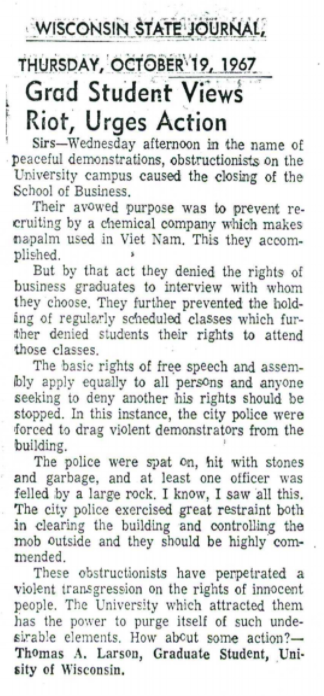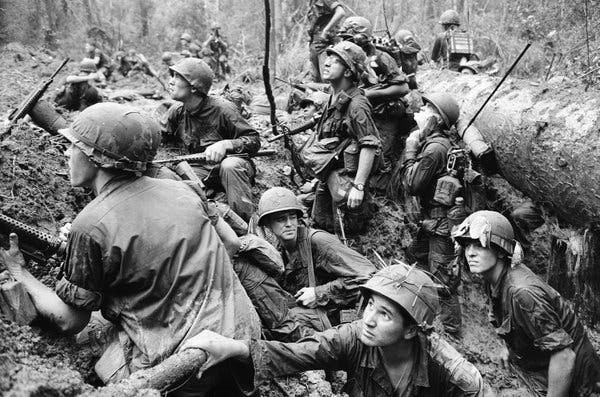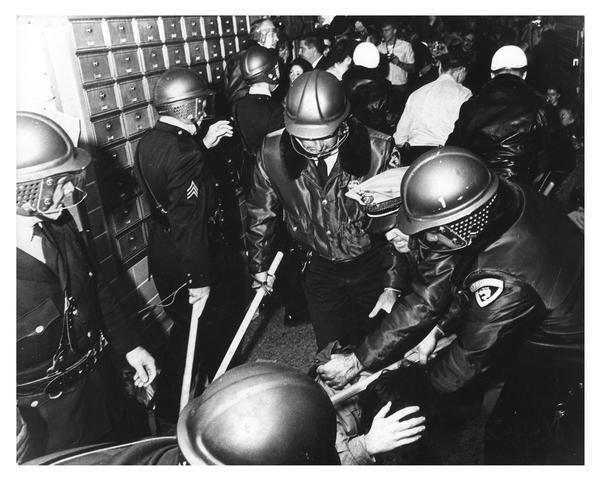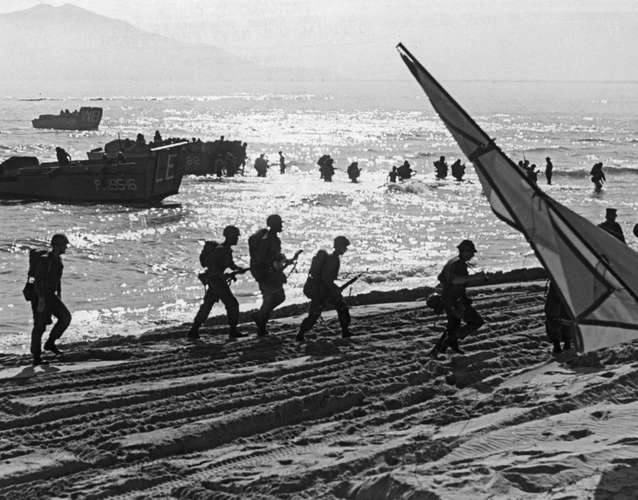"US Marines landing in Da Nang in 1965," The LIFE Picture Collection, 1965
BREAKING THE BARRIER OF BLIND OBEDIENCE
During World War II, a culture of patriotism emerged in the US: Americans enlisted and people vowed to trust their government. Counting on full citizen support, President John F. Kennedy called for involvement in Vietnam. Early on, most Americans fulfilled their expectation to support their government, blindly trusting their leaders. However, the Dow Protests questioned this blind trust by redefining the citizens' role at a time of war.
“When the war actually broke out in 64’ with the Gulf of Tonkin, we were all very patriotic, thinking…we are gonna win whatever it is we’re gonna do...” ~ Gil Funk (Air Force Veteran) in discussion with authors, May 11, 2020
UW-Madison protesters saw the US government’s inhumanity in Vietnam as un-American. The students believed the most patriotic action to take was to protest the government’s wrongful intervention. The students' stance was clear, as the SDS stated: “If we appear to seek the unattainable, as it has been said, let it be known that we do so to avoid the unimaginable” (Why Demonstrate Against Dow? 1967)
“There is a tendency at the time of almost any war of blind nationalism.” ~ David Maraniss (Associate Editor at The Washington Post and Author) in discussion with authors, October 5, 2019
Students called out the US government and the University for supporting the war. They saw the University’s decision to allow Dow interviews as blatant support for the war, given that 70% of Dow’s products went to Vietnam. The police's suppression of the protest further enraged demonstrators as they believed their freedom of speech was being obstructed.
“Jane Brotman… stopped to watch it and was so overwhelmed and overtaken by what she witnessed that she started to think more about the war in Vietnam and whether it was the right thing for the US to be doing and started questioning the government and the University and authority. And she changed forever from that event and I think that’s what happened because of the Dow Demonstrations here.” ~ David Maraniss (Associate Editor at The Washington Post and Author) in discussion with authors, October 5, 2019
“Going back to Vietnam, the Vietnam era, I think you had at that point, the beginning of a loss of confidence in government and in leadership, because… people didn’t believe what was being said.” ~ Jeff Smoller (Journalist) in discussion with authors, January 3, 2020
Stu Levitan (Historian) in discussion with authors, January 5, 2020

“Grad Student Views Riot, Urges Action,” Wisconsin State Journal, October 19, 1967

“Why Demonstrate Against Dow?”, Wisconsin Historical Society, 1967
Nevertheless, supporters of the war saw the Dow Protest as a form of oppression. The University, seen as a vessel for opportunity, was obliged to provide all students with options for their future and people felt the protesters’ actions were undermining these privileges. By blocking the Commerce Building, the students prevented their peers from getting jobs.

"American Infantrymen Searching the Trees for Vietcong Sniper," 1967, New York Times

"Using Clubs," Wisconsin State Journal, October 18, 1967

"US Marines; Da Nang Air Base," Britannica, 1965,
IMPACT: REDEFINING PATRIOTISM
Dow protesters sparked a new understanding of what it means to be patriotic, redefining patriotism as pushing for a greater nation rather than blindly following the status quo. Now, fewer people view political movements as anti-American.